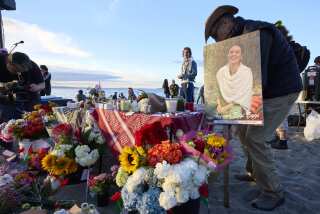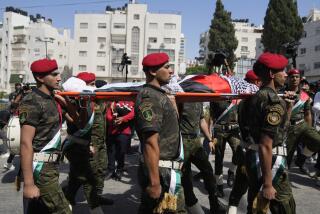Palestinian Bomber Stood Out From the Rest
RAMALLAH, West Bank — Wafa Idris told her friends and family in the Al Amari refugee camp that she wanted to sacrifice herself for her country, but they didn’t believe her.
She was a supporter of the Fatah movement of Palestinian Authority President Yasser Arafat, they said, not an Islamic extremist. She was a volunteer Red Crescent paramedic who risked her life to save others. Most important, she was a woman, and all 46 of the suicide bombers who had attacked Israel in the 16-month Palestinian uprising were male.
Then they heard that the 47th bomber was a woman.
“My heart began to pump faster,” said Idris’ mother, Wasfiyeh. “I feared it was her.”
On Sunday, a Palestinian woman with doe-brown eyes and softly curled hair carried a knapsack full of explosives into the heart of Jerusalem. When she blew herself up, she also killed an 81-year-old Israeli man and wounded scores of other people.
For days, no one claimed responsibility for the attack. No videotaped testament appeared, and no one set up a mourning tent for the shahid--the martyr--as Palestinians usually do after a suicide bombing. Israeli and Palestinian authorities said they were stumped.
But Idris’ family knew that she had not returned to the one-room cinder-block home she shared with her mother, and the truth gradually dawned on them. On Wednesday, they received confirmation that the 30-year-old was the first female suicide bomber of the intifada.
The Al Aqsa Martyrs Brigade, a militia affiliated with Fatah, claimed responsibility for the attack in a leaflet that began circulating in Ramallah early in the day. By nightfall, posters began to appear on walls around this West Bank city showing Idris and the Fatah insignia. The Palestinian liberation movement and the Al Amari refugee camp “proudly announce the first heroine martyrdom operation inside the Zionist entity,” the posters proclaimed.
“She said it was better to die a martyr than to live in humiliation,” said her sister-in-law, Wisam Idris. “But we were shocked. We didn’t expect her to do this.”
That may have been the point. Palestinian women have been involved in a few recent terror attacks. In one case, a woman allegedly led a suicide bomber in August to his target at a pizzeria in Jerusalem, an attack that killed 16 people.
In another, Amneh Mona befriended an Israeli over the Internet and lured him to Ramallah, where Fatah activists killed him last January. She is serving a life sentence in an Israeli jail.
But no one expected a Palestinian woman to commit the ultimate act of desperation--to blow herself up. Israeli police still wonder whether Idris detonated the bomb intentionally or was killed in a premature detonation, but either way, the attack has forced Israeli officials to redraw the profile of a suicide bomber and to reconsider the security threat that Palestinian women may present to Israelis.
Idris apparently had no problem entering Jerusalem from Ramallah. She didn’t attract attention until she entered a shoe store, looked around nervously and left without buying anything. Before anyone could react, there was a devastating explosion.
At a neighbor’s home in the Al Amari camp, her mother sat cross-legged on a floor cushion hugging a photograph of Idris and alternating between grief, anger and the pride she knew she was supposed to feel for a child who had given her life in the struggle for a Palestinian homeland. She was surrounded by family and friends in mourning.
“If I had known what she was going to do, I would have stopped her,” she said. “I am proud of her, of course. But I still feel sad.”
Why did Idris take her own life to kill an Israeli?
“There was nothing specific, no one thing. It was what she saw every day at work with the ambulance, all of the people who were wounded and killed by the Israelis,” her sister-in-law said.
Idris grew up in a Fatah family. Her older brother, Khalil, was arrested for being a Fatah member in 1985 and spent eight years in an Israeli prison.
“We were schoolmates, and we used to visit our brothers in prison together,” friend Itimad abu Libdeh said.
Idris was a founder of the Fatah women’s committee in the refugee camp and spent a lot of time visiting families of prisoners and “martyrs” during the first intifada, which began in 1987. She married, lost a baby to a miscarriage and divorced, but her friends rejected the idea that this drove her to desperation.
“Her love for her homeland and her love for martyrdom was such that I don’t think that if she had children it would have changed her mind,” Abu Libdeh said.
“She was very strong-willed,” her friend said. “She was very active and always wanted to join demonstrations. She would say: ‘I wish I would be sacrificed for the country. I want to do something for the country.’ I thought she was joking.”
She wasn’t. Idris woke early Sunday, dressed and bid her mother goodbye, saying she was late for her volunteer work at the Palestinian Red Crescent Society. But Idris wasn’t scheduled to work Sunday and never showed up at the Ramallah headquarters, according to the coordinator, Hossam Sharkawi.
“Typically, she worked Friday and during the clashes,” he said. “She worked in the ambulances. She evacuated victims, and she did first aid. That’s what we know her as.”
But he and others were left wondering just how well they knew Idris. Was she traumatized by all that she saw, including the 15-year-old boy shot twice in the head during a demonstration 10 days ago? Sharkawi didn’t know.
Did she have a secret life with a clandestine paramilitary organization? Her brother Khalil didn’t know. Neither did her schoolmates.
“No one would do something like this on her own,” Abu Libdeh said. “She had to have someone behind her.”
Like the dozens of other women who came to pay their respects to the grieving family, Abu Libdeh said she admired her friend for what she had done. The women said they had no qualms about killing Israeli civilians, because, they said, Israelis kill Palestinian civilians.
“I think she will be a role model,” Abu Libdeh said.
“We don’t have any objections to a woman doing anything like this,” Idris’ mother added. “If I could do it myself, I would.”
More to Read
Sign up for Essential California
The most important California stories and recommendations in your inbox every morning.
You may occasionally receive promotional content from the Los Angeles Times.










